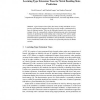Free Online Productivity Tools
i2Speak
i2Symbol
i2OCR
iTex2Img
iWeb2Print
iWeb2Shot
i2Type
iPdf2Split
iPdf2Merge
i2Bopomofo
i2Arabic
i2Style
i2Image
i2PDF
iLatex2Rtf
Sci2ools
214
click to vote
ML
2011
ACM
2011
ACM
Relational information gain
Abstract. Type Extension Trees (TET) have been recently introduced as an expressive representation language allowing to encode complex combinatorial features of relational entities. They can be efficiently learned with a greedy search strategy driven by a generalized relational information gain and a discriminant function. In predicting the metal bonding state of proteins, TET achieve significant improvements over manually curated motifs, and the expressiveness of combinatorial features significantly contributes to such performance. Preliminary collective classification results seem to indicate it as a promising direction for further research. 1 Learning Type Extension Trees A TET [1] consists of a tree-structured logic formula where nodes are conjunctions of literals, and edges are labeled with sets of variables. Instead of a simple truth assignment, a TET defines a complex combinatorial feature whose recursive value structure accounts for the number of times each subtree can be ...
Combinatorial Feature | Complex Combinatorial Feature | Machine Learning | ML 2011 | Type Extension Trees |
Related Content
| Added | 29 May 2011 |
| Updated | 29 May 2011 |
| Type | Journal |
| Year | 2011 |
| Where | ML |
| Authors | Marco Lippi, Manfred Jaeger, Paolo Frasconi, Andrea Passerini |
Comments (0)

